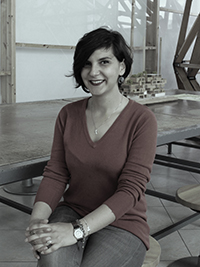Elga Luca

XXIX Cycle - (A.A. 2013-2014)
IDAUP
Home Institution: Polis University Tirana
Scholarship
Curriculum: Architecture (ICAR08)
Research Topic: Albanian Industrial Archeology
Tutor DA-UNIFE: Vincenzo Mallardo
Tutor Polis University: Luljeta Bozo
Nationality: Albanian
Email: egla_luca@universitetipolis.edu.al
Profile
Biography
Egla Luca is an Albanian civil engineer, currently working as a lecturer and vice head of department at the Department of Architecture and Engineering at POLIS University Tirana, Albania. Her Master of Science Degree in “Structural Design” is obtained from the Polytechnic University of Tirana / Faculty of Civil Engineering with a research about the seismic vulnerability of health care facilities in Tirana/Albania. She deepened her studies also in a joined study program between IHS / Erasmus University Rotterdam, the Netherlands and POLIS University, in the field of Aesthetic and Structural Design. Egla obtained her PhD degree from the University of Ferrara, Italy focusing in “The reuse of Albanian Industrial Archeology as an approach to sustainability and conservation. Research on the new evidences of expression of the former industrial buildings with the implication of 3R; Retrofit, Re-Use, Revitalize”. Despite her academic activity, Egla Luca is very active also in the field of structural end energetic design and collaborates closely with the design office “Metropolis”. She is part of many international projects such as Erasmus + projects (DAPEEWEB,CONSUS, etc), E-Cost projects, etc. Egla has numerous national and international publications in the field of “Seismic Vulnerability Assessment”, “Industrial Archeology in Albania”, “Energy Performance of the building stock” and “Structural Retrofit”. Lately she just finished the translation of “Seismic Design for Architect – outwitting the quake” by Andrew Charleson. Her expertise has been applied in several international events and workshops such as: “Albanian Riviera” 2014; “Revitalization of St. Anna Complex Ferrara” 2014; “Sicily Lab” 2012; co-organizer of “GEO-ENVIRONMENT AND CONSTRUCTION - European Conference in Geo-Environment and Construction” etc
Research skills
Albanian Industrial Heritage | Retrofit | Re-Use | Cultural Heritage | Industrial
Development
Scientific activities
ORCID ID:
0000-0003-4501-2999
IRIS UNIFE ID:
rp00000
Doctoral research
The reuse of Albanian Industrial Archeology as an approach to sustainability and conservation. Research on the new evidences of expression of the former industrial buildings with the implication of 3R; Retrofit, Re-Use, Revitalize
Referring to the Albanian past and the possession of a large number of industrial heritage sites, with outstanding cultural and historical values; based on the lack of any complete study or prior research about Albanian Industrial Heritage, taking also into consideration the lack of information and comprehension about this subject from institutions dealing with cultural heritage as well as that of wider public in Albania, I started a research about the “Assessment of Industrial Heritage in Albania”. The strategic vision of the research is: “To guarantee that the Albanian Industrial Heritage is recognized and watched over as a part of social, architectural, cultural and economic values”; whilst the project’s future goals are focused on registration and development of Research Strategies in order to find adequate approaches towards them. On the other hand, this research seeks to increase awareness about Albania’s industrial past by urging a debate about industrial heritage and its future within a heritage framework. Industrial archaeology (IA) is the systematic study of material evidence associated with the industrial past. Industrial archeology practices interdisciplinary method of all evidence, physical and non-physical, documents, structures, and natural landscapes, and human settlements, urban layers, created for or from industrial processes. It uses these methods for reading the past and the present of industries. We assess Industrial Heritage in relation to architecture, landscape, environment and other elements associated with them and possible ways how to upgrade or better revitalize abandoned industrial areas into spaces for better knowing our own past and at the same time transforming them into a driving force for sustainable and integrated development. Albania today is crammed with numerous used and unused buildings - such as former industrial buildings - which are the legacy of almost 50 years of communist rule. The industrialization of the country spanned over a period of almost 150 years, starting from the earlier industrial traces to the end of the communist era. The process of de-industrialization in Albania has led to the depopulation and the abandonment of entire industrial areas. Today, the challenge rests on how to put industrial spaces back into function. The assessment aims at the eventual revitalization and reuse of these structures, depending on many factors and perspectives. With the enlargement of the city, former peripheral areas are becoming gray “spots” inside the city In this thesis, I would like to analyze former industrial areas, taking into consideration three basic elements. The period and the category of buildings that will allow me to get a general overview of industrial areas as well as the assessment of possibilities and costs of requalification of the industrial area. The design and re-adaption of industrial structures will be studied in order to understand the evolution in space and time of these buildings; the changed characteristics related to the progress of the technology; the main functional and technical elements of these structures and mostly to understand the impact that these developing technologies and designing procedures also affect the city and our way of perceiving it. Finally, the aim of the research will be to provide the appropriate strategies and instruments for an aesthetic reuse and revitalization of these buildings in our cities.
Keywords
Retrofit | Re-Use | Industrial Development | Cultural Heritage | Seismic Vulnerability Assessment

